Cite this document
(“Developments in the 19th Century that Drove the Shifts in Imperial Research Paper”, n.d.)
Retrieved from https://studentshare.org/history/1440747-developments-in-the-nineteenth-century-that-drove
Retrieved from https://studentshare.org/history/1440747-developments-in-the-nineteenth-century-that-drove
(Developments in the 19th Century That Drove the Shifts in Imperial Research Paper)
https://studentshare.org/history/1440747-developments-in-the-nineteenth-century-that-drove.
https://studentshare.org/history/1440747-developments-in-the-nineteenth-century-that-drove.
“Developments in the 19th Century That Drove the Shifts in Imperial Research Paper”, n.d. https://studentshare.org/history/1440747-developments-in-the-nineteenth-century-that-drove.


